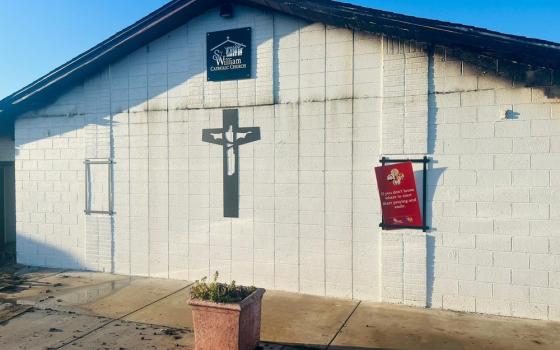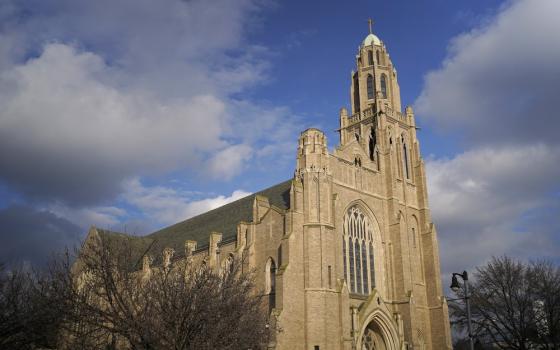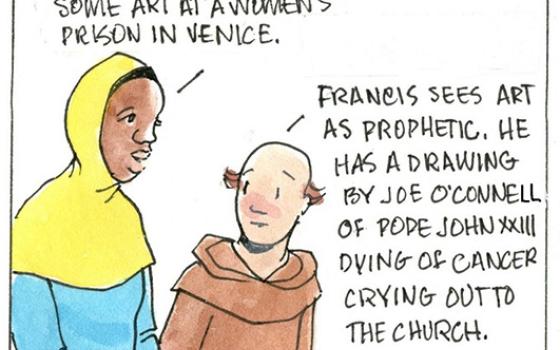
(Unsplash/Moriah Wolfe)
I was driving along a New Mexico desert highway on a 95-degree day in early June with one intention — to free an asylum seeker.
The Otero County Processing Center, otherwise known as immigration detention, has a deceiving name, in that few asylum seekers are actually processed and released from here. Instead, they remain locked up behind steel doors in a windowless, concrete building surrounded by high fencing with barbed wire, a place that chillingly resembles the county prison located next door.
No one would ever visit this offensive no-man's land unless determined to connect with, and possibly help, someone. Let's call my someone Sofia: a young mother who'd fled her home in Colombia because her political involvement had endangered her life. I was on my way to pay the bond that Immigration and Customs Enforcement (ICE) had set for her release.
I had never met Sofia, but we'd spoken on the phone. I knew she had left behind her husband and daughter, and everyone she loved, to reach the U.S. border asking to receive asylum. Instead, she received shackles around her ankles. I knew that for the past four months she had been detained at Otero under harassing and hostile conditions at the hands of her deportation officer.
I also knew that she had unsuccessfully applied to be released on bond to a sponsor while she awaited her court case. She had been denied three times, despite having no criminal record and not posing a threat of any kind. The decision for her release was at the sole discretion of this deportation officer.
In the world of asylum seekers, everything that happens to them is based on the discretion of others. That often means at the whim of authority.
If and when an asylum seeker is released from detention, it is never quick nor simple. Sofia's attorney warned me that the process would take hours. I tried to prepare myself.
When they request asylum at our southern border, a Customs and Border Protection agent decides whether they'll be placed in detention or allowed to travel to their sponsor while awaiting their court date. Once confined in ICE custody, a single officer can decide, as in Sofia's case, whether they can be released on bond.
As for winning asylum, a judge can choose to deny asylum at his or her discretion, no matter the evidence of credible fear. And if no defending attorney is present, there's no witness to challenge the legitimacy of that decision, nor the treatment received at the hearing.
Asylum seekers don't have choices, clear and simple — except for the initial choice of leaving home or staying and facing the consequences. For Sofia, remaining in Colombia would have meant testing the legitimacy of the death threats she received following her physical and sexual assaults. She chose to flee.
When I learned of Sofia's case through serving on the board of directors of Las Americas, an immigrant advocacy nonprofit located in El Paso, Texas, that provides pro bono and low-cost legal services, I knew I would help her. By volunteering on this board and at El Paso migrant shelters over the years, and through visiting asylum seekers in detention pre-COVID, I'd learned enough about the hellish conditions of privately run facilities like Otero to want to do whatever I could.
After her third denial, Las Americas filed a complaint against her deportation officer, whose hostility had increased, and ICE promptly set a bond for Sofia's release before any recrimination could be documented. Knowing Sofia needed to be released ASAP and that applying for bond money from a local nonprofit would take several days, I offered to front the money and take her home with me. I'd worry about being reimbursed later.
Sofia is one of the lucky ones. More than 80% of asylum seekers do not have legal representation and must languish in detention until they will most likely be deported. Most are ill-prepared to legally represent themselves and face intimidation from the ICE agent, from the judge and from the government attorney questioning them as they attempt to defend their case clad in detention-assigned prison garb.
Advertisement
If and when they are released from detention, it is never quick nor simple. Sofia's attorney warned me that the process would take hours. I tried to prepare myself. I had set out early that morning to get a cashier's check, then headed to the detention facility with a book under my arm and a prayer in my heart.
After the security guard beeped me through the metal detector, I completed the paperwork "for release of an alien," handed over the cashier's check and sat down to wait. At noon, an ICE employee told me they were closing for lunch and would reopen in an hour, meaning nothing more would happen until later that afternoon.
Although ICE refers to immigration detention as "nonpunitive," everything that happens in these facilities is evidence against that description. Despite having committed no crime, asylum seekers wear ankle monitors while locked up. They endure verbal abuse, are called illegals, prisoners and even criminals, though they are in "civil detention."
They can be placed in isolation, sleep under freezing conditions and harsh lighting and be force-fed. When they enter detention, ICE takes all their possessions and throws away their clothing. No longer treated as human beings, they are considered numbers. In fact, ICE assigns each person an "alien number," which will identify them throughout their case.
I knew all this, but had not yet experienced the negative treatment of those who advocate for them. I spent most of that day at the processing center dealing with crass, curt and intimidating ICE employees before everything was approved and Sofia was released, only to be called the next morning and told I needed to return. ICE had mishandled my check and it needed to be replaced.
No matter how inconsiderate or unrealistic their requirement, I had to comply. To not return to Otero would jeopardize Sofia's freedom. They had all the power. They were in control of the life I wanted to free.
When I returned, it was not a smooth exchange. The employee took my check and retreated behind closed doors with no explanation.
Somewhere during my waiting hours, growing impatient and frustrated, I remembered words Dorothy Day wrote in her later years. How she found it helpful to have shared in a "little of the misery of the imprisoned." I've never been imprisoned for civil disobedience, as Dorothy had, yet as I sat on that metal chair feeling powerless, I understood something of what Dorothy felt. Yet she continued believing in prayer and sacrifice, in the sacrificing of one's own comfort and cravings.
The terse and offensive responses from those in authority, the steady push upstream against a forceful tide of anti-refugee, anti-asylum decision-makers. This is the system social justice and human rights advocates are working against.
Such fierce devotion in the midst of powerlessness can only come from grace. I prayed that I would experience such grace. I knew this certainly was a very small sacrifice of my own comfort, in exchange for something invaluable.
I also knew that I'd been given just a tiny taste of what immigration attorneys and paralegals handling asylum cases deal with every day. The terse and offensive responses from those in authority, the steady push upstream against a forceful tide of anti-refugee, anti-asylum decision-makers. This is the system social justice and human rights advocates are working against.
In the end, all that mattered was that Sofia was released.
I hugged her like a mother welcoming her daughter after a long absence. We spent our first evening together sharing a simple homemade meal. After months of Otero's refried beans and tortillas, neither of which are part of a Colombian diet, my cooking delighted her.
She viewed everything with a child's exuberance: the moon on our evening walk in a night sky she hadn't seen for months, the new pair of shoes that I bought to replace the blister-causing pair she'd been assigned in detention, FaceTime calls with family that made her squeal with delight.
According to the Oxford English dictionary, the word alien, when used as an adjective, means belonging to another person, place or family; from elsewhere, foreign. It's true. Sofia belongs to another family, another country. But in welcoming her into my home, I received a great gift.
This experience was about much more than simply following Jesus' directive in Matthew 25 to welcome the stranger. It's about taking our faith to the next level of engaging in spiritual practices that place us in an ever-deepening awareness of God's presence. From this place, we know our life is not our own and our service is to one another — and no one is excluded from this circle of service. As Mother Teresa said, we have drawn our family circle too small.
As I write this, I think of hundreds of our brothers and sisters locked up in detention facilities. They often remain in the shadows, their voices unheard, their abuses unnoticed. Being able to help release even one person, one "alien," was a grace beyond description. And although Sofia's family called me an angel, the truth is, I had been entertaining one right in my own home.











